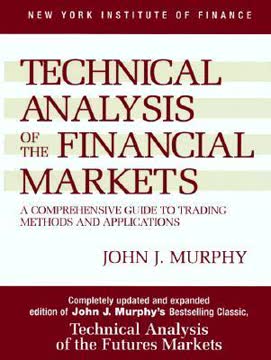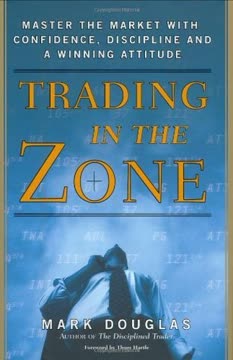Key Takeaways
1. Develop a robust trading methodology based on price action, not opinions
"The wisdom is in the price action, not our opinions. Our skills in trading are based on how well we're able to hear what the charts are telling us and trade accordingly."
React, don't predict. Successful traders focus on reacting to actual price movements rather than trying to predict future outcomes. This approach involves:
- Identifying trends using tools like moving averages, support and resistance levels, and chart patterns
- Entering trades based on confirmed breakouts or bounces off key levels
- Exiting trades when price action indicates a trend reversal
By basing decisions on observable price action, traders can avoid the pitfalls of emotional decision-making and reduce the impact of personal biases on their trading performance.
2. Master risk management to ensure long-term survival in the markets
"Risk management is really the final judge on whether we make it as traders or not, even if we have a great trading method and have the right mindset."
Protect your capital. Effective risk management is crucial for long-term success in trading. Key principles include:
- Risking no more than 1-2% of total trading capital on any single trade
- Using proper position sizing based on volatility and account size
- Implementing stop-loss orders to limit potential losses
- Avoiding the temptation to "revenge trade" after a string of losses
By prioritizing risk management, traders can survive drawdowns and maintain the capital necessary to capitalize on future opportunities.
3. Maintain discipline and follow your trading plan, especially during drawdowns
"Survival as a trader is based on the ability to stay disciplined with entries, exits, and risk management. Once discipline is abandoned, the clock starts ticking to eventual ruin."
Stick to the plan. Discipline is crucial for trading success, particularly during challenging periods. To maintain discipline:
- Develop a detailed trading plan that outlines entry and exit criteria, position sizing, and risk management rules
- Commit to following the plan regardless of emotions or recent performance
- Reduce position sizes during drawdowns rather than increasing risk to "get even"
- Regularly review and update the plan based on market conditions and performance, but only during non-trading hours
Maintaining discipline allows traders to weather difficult periods and capitalize on opportunities when market conditions improve.
4. Focus on asymmetric risk-reward ratios to maximize profits
"Risk a little to make a lot. If you risk 1% of your trading capital, do it for the opportunity to make at least a 3% return on your capital."
Optimize risk-reward. Focusing on trades with favorable risk-reward ratios can lead to long-term profitability, even with a lower win rate. Key concepts include:
- Aiming for a minimum 1:3 risk-reward ratio on trades
- Using trailing stops to maximize profits on winning trades
- Understanding that a system can be profitable with a win rate as low as 33% if the risk-reward ratio is favorable
By prioritizing asymmetric risk-reward opportunities, traders can ensure that their winning trades more than compensate for their losses over time.
5. Become an expert in your chosen markets and trading vehicles
"The reason I make money is because I am a top expert in the world for the markets I trade and the method I use."
Specialize and excel. Focusing on a specific market or trading vehicle allows traders to develop deep expertise and gain an edge. To become an expert:
- Study historical price action, trends, and patterns in your chosen market
- Understand the fundamental drivers and typical behaviors of your trading vehicles
- Continuously analyze and refine your trading approach based on market data
- Stay informed about relevant news and events that may impact your trades
By developing specialized knowledge, traders can identify high-probability opportunities and make more informed decisions.
6. Control your emotions and maintain a healthy trading psychology
"Trading success comes from first researching what the right decisions are to be profitable and then being able to stick to those right decisions when the time comes and not be stopped by internal barriers."
Master your mind. Emotional control is essential for consistent trading success. Strategies for maintaining a healthy trading psychology include:
- Separating self-worth from trading results
- Practicing mindfulness and stress-management techniques
- Developing a personal philosophy or spiritual practice to maintain perspective
- Viewing each trade as just one of many in a long-term career
By managing emotions effectively, traders can avoid impulsive decisions and maintain focus on their long-term goals.
7. Continuously educate yourself and adapt to changing market conditions
"The best traders come down to those who are able to manage stress the best, persevere, and keep their egos in check."
Never stop learning. The markets are constantly evolving, and successful traders must adapt to changing conditions. To stay ahead:
- Regularly review and analyze your trading performance
- Study new trading strategies and market developments
- Attend seminars, read books, and engage with other traders to expand your knowledge
- Be willing to adjust your approach when market conditions change
Continuous education and adaptation allow traders to maintain their edge and capitalize on new opportunities as they arise.
Last updated:
Similar Books










Download PDF
Download EPUB
.epub digital book format is ideal for reading ebooks on phones, tablets, and e-readers.




![By Steve Burns Show Me Your Options! The Guide to Complete Confidence for Every Stock and Options Trader Seeking Co [Paperback] Summary](https://images.sobrief.com/social/cover_show-me-your-options-the-guide-to-complete-confidence-for-every-stock-and-options-trader-seeking-consistent-predictable-returns_360px_1747222166.jpg)



